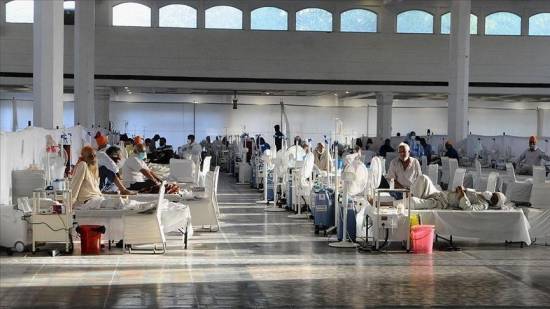India’s government needs to put more focus on the primary healthcare system and inject additional funds to provide quality and affordable services, according to healthcare analysts.
Coinciding with Universal Health Coverage Day, observed Sunday, experts urged provincial governments to play a role in ensuring people have access to comprehensive health care.
"The federal government has started down the path of universal health coverage, but there’s a lot to go in terms of strengthening health systems, and state governments must play a critical role in that," public health expert Dr. J.S. Thakur told Anadolu Agency.
"Universal health coverage in India cannot happen in isolation. The funds spent on health care presently are low, and the states should start investing in health, especially with a focus on universal health coverage."
India earlier this year was hit by a deadly second wave of the coronavirus pandemic, severely straining its healthcare system and highlighting the need to revamp the health infrastructure. The pandemic brought to the fore weaknesses of the three-tiered Indian health system.
Thakur, who is head of the India-based World Noncommunicable Disease Federation, said post-pandemic there has been increased investments in the health infrastructure in the country but a lot more has to be done.
"There should be a budget earmarked especially for strengthening primary health care and health promotion,” he said. “India is a populous country and it’s important that we strengthen primary health care. If it is improved, 70%-80% of the population can be helped, as most of their health problems can be addressed at this level.”
The public health expert also said that health is a state subject in the country and implementation of programs has to be strengthened.
"There is a shortage of human resources, and even progressive states have a shortage of human resources. We need to address this,” he said. “We need to improve health governance and similarly, the states, too, need to increase the health allocation of funds.”
India currently has the Ayushman Bharat program, which also aims at providing healthcare coverage to more than 100 million poor and vulnerable families.
In 2018, the government had announced Ayushman Bharat health reform with two components: Health insurance and reinvestment in primary care by transforming existing facilities into new health and wellness centers that provide comprehensive primary care.
Last month, the government and the Asian Development Bank agreed to a $300 million loan to strengthen and improve access to comprehensive primary health care in urban areas of 13 states.
Workforce problem
K. Srinath Reddy, president of the Public Health Foundation of India think-tank, told Anadolu Agency that while things are improving in terms of greater investment in infrastructure and digital health, efforts are required for investment in the health workforce.
A study in the international journal Humans Resources for Health highlighted that the health workforce estimates in the country are well below the World Health Organization’s "threshold of 44.5 doctor, nurses and midwives per 10,000 population."
"While investing in infrastructure as well as in digital health, we need to focus a lot on strengthening and health workforce, particularly at the primary healthcare level," said Reddy.
The renowned health expert said the health insurance program has yet to cover all the aspects it should.
"It doesn't yet cover primary health care, it doesn't cover outpatient care medicine. We must bridge those cases as well,” he explained.
“It doesn't cover all conditions. In COVID, it didn’t cover much of COVID, it didn’t cover post-COVID care."
He added that "empaneled hospitals are not adequate to cover the entire population."
A survey released last week by the Indian community platform LocalCircles revealed that 39% of respondents paid bribes for COVID-19 treatment at a hospital during the second wave.
Reddy noted that a lot needs to be done at the federal and state government levels.
"We need to definitely enhance infrastructure and workforce because you may create demand but until the supply matches the demand, you may not be able to sufficiently cover and service coverage," said Reddy.
He said universal healthcare coverage is essential as a part of our developmental investment.
"The COVID-19 pandemic has brought into very clear focus the need for building strong health systems which are efficient, equitable, and empathetic and can deliver reliable health services of high quality even when there is no pandemic," he said. "Only then can we meet public health emergencies."
More centers
On Friday, the government said it is aiming to set up 150,000 Ayushman Bharat Health and Wellness Centres (AB-HWCs) by December 2022 "to deliver Comprehensive Primary Health Care closer to the home."
"Under Ayushman Bharat, the existing Sub-health Centres and Primary Health centers are being transformed into AB-HWCs to deliver Comprehensive Primary Health Care that includes preventive, promotive, curative, palliative and rehabilitative services which is universal, free and close to the community," the Health Ministry told parliament, adding that currently, 80,545 Ayushman Bharat Health and Wellness Centres are operational./aa


